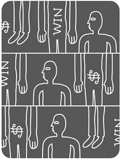Rolling snake eyes
McGill film explores problem gambling among teens
Even on the small screen, Did-Tafari Belizaire - and the story he tells - is riveting. The 37-year-old "star" of the 20-minute docudrama Clean Break, is a recovering compulsive gambler whose 15-year addiction drove him to the very depths of despair. His emotional spiral downward was tragically mirrored in what he thought would be his last act on Earth; throwing himself off the Jacques Cartier bridge after yet another lost night at the Casino.

Tzigane
The film was conceived by McGill's International Centre for Youth Gambling and High-Risk Behaviors in an effort to sensitize adolescents on the dangers of excessive gambling.
And while the stereotype of a problem gambler has always been closer to a Vegas lounge rat than an average teenager, Jeffery Derevensky, the centre's co-director, says that the prevalence rate among teens is "two to four times higher than that of adults."
Part of the problem lies in the fact that rolling the dice means big bucks for government - especially in Canada where gambling is state run and operated.
"The government owns it. The government promotes it. And most governments are now call it 'gaming' to try and sell it as a socially acceptable form of entertainment," says Derevensky.
"Last year alone, after all expenses, the Quebec government's net revenue from gambling was $1.3 billion."
In the eyes of parents, gambling seems almost benign - the lesser of numerous evils stalking their children. Some kids begin gambling as early as nine, playing cards for money with their family. The typical trajectory sees them moving on to sports pools, lotteries and, eventually, online gambling.
And while the vast majority of teens never develop a serious problem, the ones who do get caught in a cycle that can alter the course of their lives. "First they start selling their own possessions to support the habit," says Derevensky. "Then they will steal from home. The next step is petty theft, credit card scams and bank fraud." When asked if there is a typical profile of a problem gambler, Derevensky shakes his head. "Gambling is an equal-opportunity destroyer."
In Clean Break, Belizaire's story is interspersed with a trio of fictionalized storylines involving three young adults as their pastime takes over their lives. The actors, who are all members of Vanier College's drama department, went through a series of workshops to understand the mentality of a teenager addicted to gambling. This, along with an edgy, original score and fast-paced editing, is designed to grab the attention of adolescents.
In the end, however, it is Belizaire, the only non-actor, who steals the show. In the denouement, it is revealed that he is a paraplegic as a result of his attempted suicide. Despite his painful past and the long road before him, Belizaire remains remarkably upbeat - at peace with himself after finally kicking his habit. "After all I've been through, there's one thing I know for sure," he says. "I've earned my freedom. I know what freedom is all about."

